Ekaterinburg will host the 32nd Summer Universiade! With a unanimous vote, the FISU Executive Committee elected the Russian city to hold the 2023 event
 FISU Executive Committee in session
FISU Executive Committee in session
NAPOLI— With one day remaining until more than 6,000 athletes march into San Paulo Stadium to officially open Summer Universiade 2019, Ekaterinburg’s awarding of the 2023 event edition provided the peak experience to the second and final day of the FISU Executive Committee’s biannual meeting. And for good reason: the attribution signing ensures the future of university sport’s crowning event a home for at least the next four years.
SUMMER UNIVERSIADE AWARDING MAKES FOR EKATERINBURG’S BIG DAY
Following the bid city’s presentation, the FISU Executive Committee granted the 32nd Summer Universiade to Ekaterinburg with a 23-0 vote in favour.
FISU President Oleg Matytsin delivered the news: “Officially we make the decision to attribute the Summer Universiade 2023 to Ekaterinburg. Congratulations!”
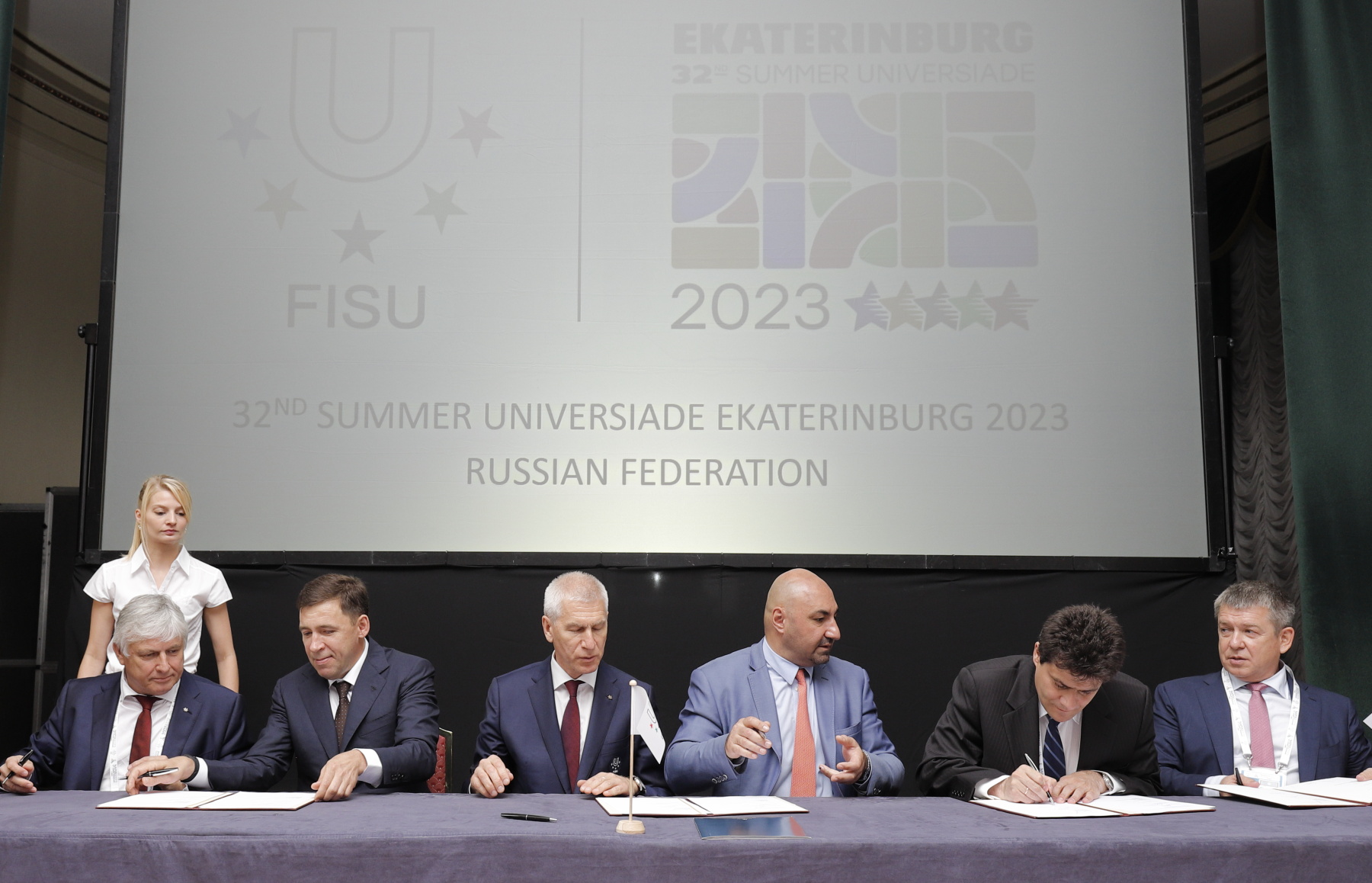 Ekaterinburg and FISU leaders sign the attribution agreement to the 32nd Summer Universiade Matytsin’s words were met with smiles and celebrations from Ekaterinburg’s representatives and FISU executive leaders alike. And for good reason: the recent experience of Kazan 2013 and Krasnoyarsk 2019 hosting the summer and winter Universiades has shown the country to be a reliable university sports partner and experienced event host.
Ekaterinburg and FISU leaders sign the attribution agreement to the 32nd Summer Universiade Matytsin’s words were met with smiles and celebrations from Ekaterinburg’s representatives and FISU executive leaders alike. And for good reason: the recent experience of Kazan 2013 and Krasnoyarsk 2019 hosting the summer and winter Universiades has shown the country to be a reliable university sports partner and experienced event host.
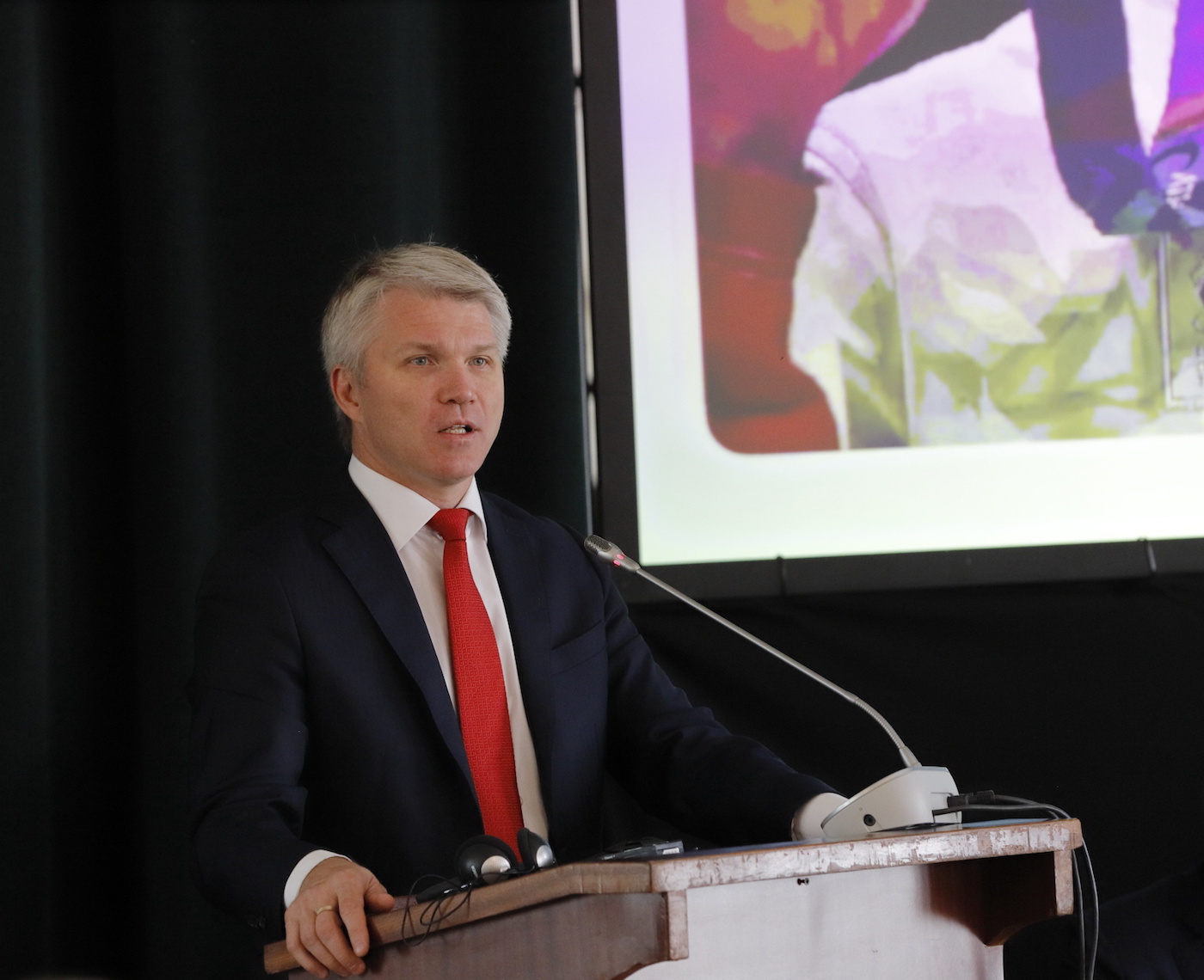 A list of important dignitaries and sports leaders delivered the bid to the FISU leadership. As Anna Kopenkina, Deputy Director Universiade 2023 Bid Committee, delivered the presentation as MC, Russia’s sport minister Pavel Kolobkov presented the bid’s vision for the region.
A list of important dignitaries and sports leaders delivered the bid to the FISU leadership. As Anna Kopenkina, Deputy Director Universiade 2023 Bid Committee, delivered the presentation as MC, Russia’s sport minister Pavel Kolobkov presented the bid’s vision for the region.
Evgeny Kuivashev, governor of the Sverdlovsk Region, discussed how Ekaterinburg was a modern city of 1.5 million, inspired by sports and a university-going population that totals 200,000 students.
“We’re a city of sports, with over 1,700 sports facilities and 39 sports schools,” Kuivashev said. “Preparation for these games will increase the impact participation of physical activity in this sports city and will be a powerful economic driver for the region.”
Look for ideal weather conditions for top sports performances in Ekaterinburg, which are planned to take place from 8-19 August 2023. “I would say this is the perfect time for the Universiade,” said Alexander Chernov, the Universiade 2023 bid’s director general. “The International sports programme isn’t as full. It’s also a comfortable time to compete as well, with an average temperature of 23 degrees.”
Media operations at Summer Universiade 2023 will benefit especially from these previous events, as the International Broadcast Centre and Main Press Centre are already in place, full equipped and successfully stress-tested during the 2018 FIFA World Cup Russia ™, and contributing to that event’s legacy.
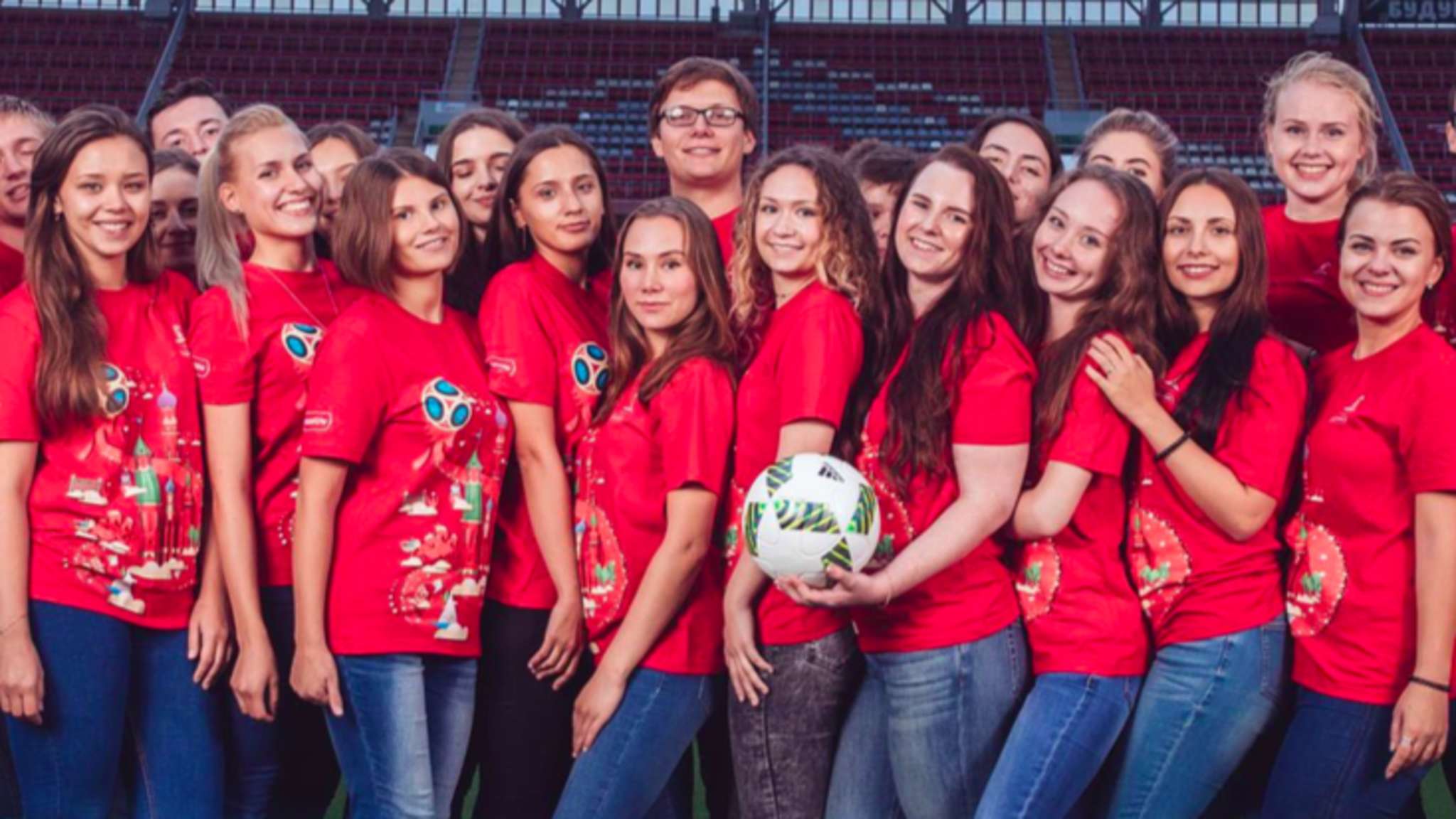 In addition to the infrastructural legacy of hosting events such as the FIFA World Cup, Ekatarinburg has built a strong pool of staff and volunteers with specific sports management experience
In addition to the infrastructural legacy of hosting events such as the FIFA World Cup, Ekatarinburg has built a strong pool of staff and volunteers with specific sports management experience
Ekaterinburg 2023’s sports programme will incorporate FISU’s 15 compulsory sports: archery, artistic gymnastics, athletics, badminton, basketball, diving, fencing, judo, rhythmic gymnastics, swimming, table tennis, taekwondo, tennis, volleyball, water polo.
Universiade host cities may also present up to three optional sports for inclusion into that edition of the Universiade today. Ekaterinburg presented boxing, rugby sevens and sambo for the 2023 event. The FISU executive committee unanimously accepted all three.
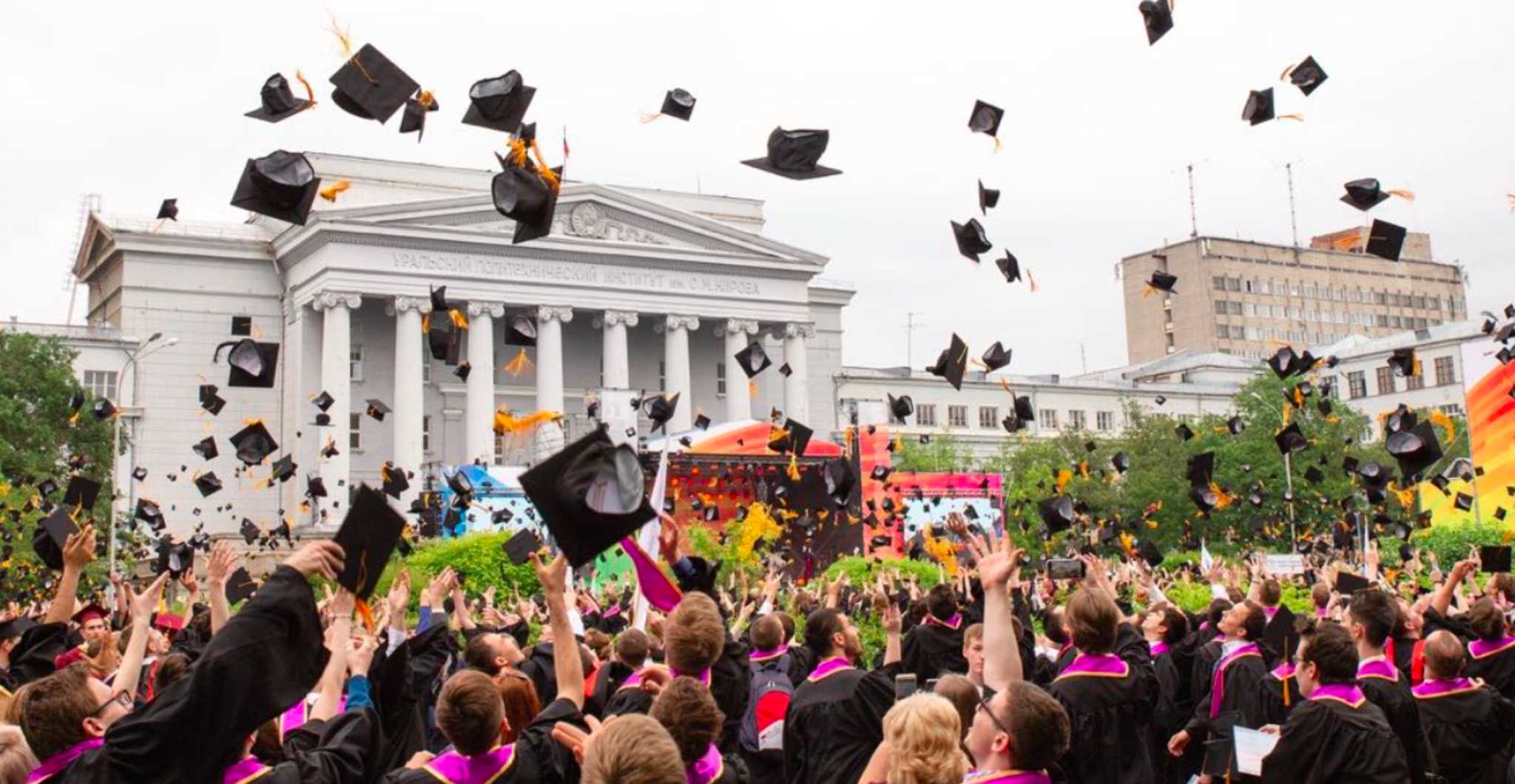 School is definitely in session in Ekaterinburg as well, with over 200,00 students attending university within the city
School is definitely in session in Ekaterinburg as well, with over 200,00 students attending university within the city
The Ekaterinburg bid presented the city as compact hub, where training and competition for all 18 sports would take place across 28 venues. Twenty of these venues are currently in place and home to sports activity. Of the eight anticipated additional venues, only one would be purpose-built in anticipation of the Summer Universiade.
“This development is part of the city’s central development plan,” said 2023 bid director general, Alexander Chernov. “These sports complexes will be built whether or not you attribute the games to Ekaterinburg, but, of course, we hope you do.”
The FISU Executive Committee did, unanimously.
TAKING INSPIRATION FROM AMERICA’S UNIVERSITY SPORT SYSTEM
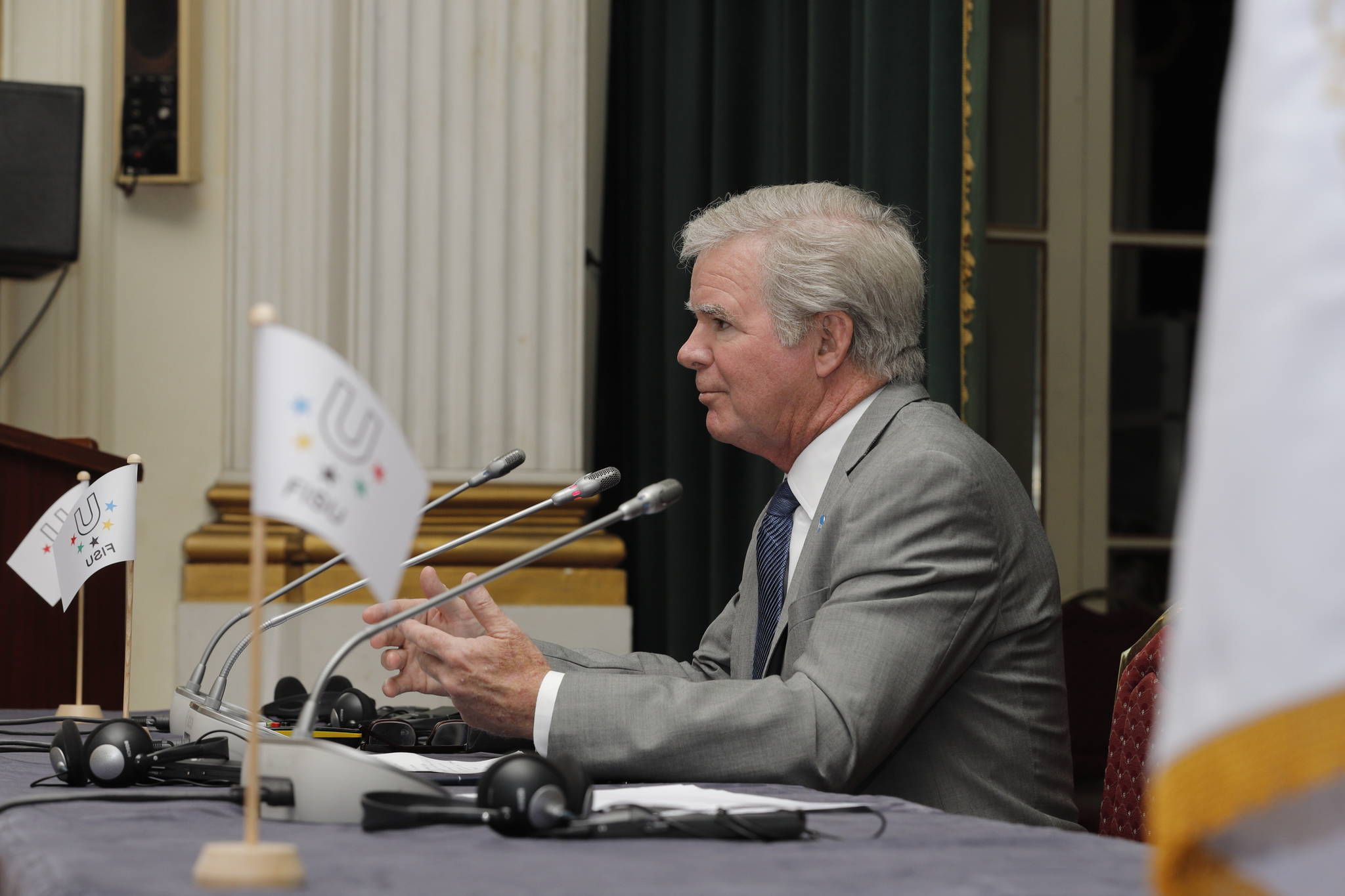 NCAA President Mark Emmert holding court with a question-and-answer style presentation with the FISU Executive Committee leadership
NCAA President Mark Emmert holding court with a question-and-answer style presentation with the FISU Executive Committee leadership
With more than 500,000 competitors across 19,000 university teams from 1,100 universities and an economic sports engine that generates 3.3 billion dollars of revenue annually that gets funneled back into university sport and student-athlete academic scholarship, the America’s National Collegiate Athletic Association (NCAA) is a behemoth.
The non-profit organisation is member-led by the presidents of America’s top universities. The NCAA today is former University of Washington rector Mark Emmert led an engaging question-and-answer session with his university sport counterparts. Emmert’s breezy, but confident and direct manner conversation didn’t hurt, either.
When asked how the NCAA stays atop new trends and innovations in sport, Emmert explained that no matter how large the NCAA organisation got, it is always in contact with what is going on the campuses. Helping this is how the NCAA is governed: the board of directors must be university presidents. “The rules of the NCAA are made by the universities themselves,” Emmert explained. “The schools come together and decide what rules they will put in place to ensure competitive balance among themselves.”
The question of esports isn’t going anywhere, says Emmert. “We’re having very vigorous discussions on esports. Is this something we want to be engaged in? We already have esports players wearing their varsity jackets and representing their universities in competitions. But is this something that the NCAA would like to lend its brand, its credibility and structure to?
“There’s some things about esports that we like and there’s some things about it we don’t like, but it’s not up to me to choose,” Emmert added. “Decisions at the NCAA are very democratic; it’s up to the schools themselves to decide. We have a representative group of schools coming together regularly to debate this.”
The final message from Emmert was one of seeking greater collaboration with the international university sports system.
“We’re here today. We want to have deeper engagement with FISU and the World University Games, we want to contribute to the greater university sports movement,” Emmert said. “I am certain you will see more athletes from our schools at international events. We’re working it.”
Added Emmert: “And our universities like to recruit international athletes.”
PILOTING HEALTHY LIVING ON CAMPUSES AROUND THE WORLD
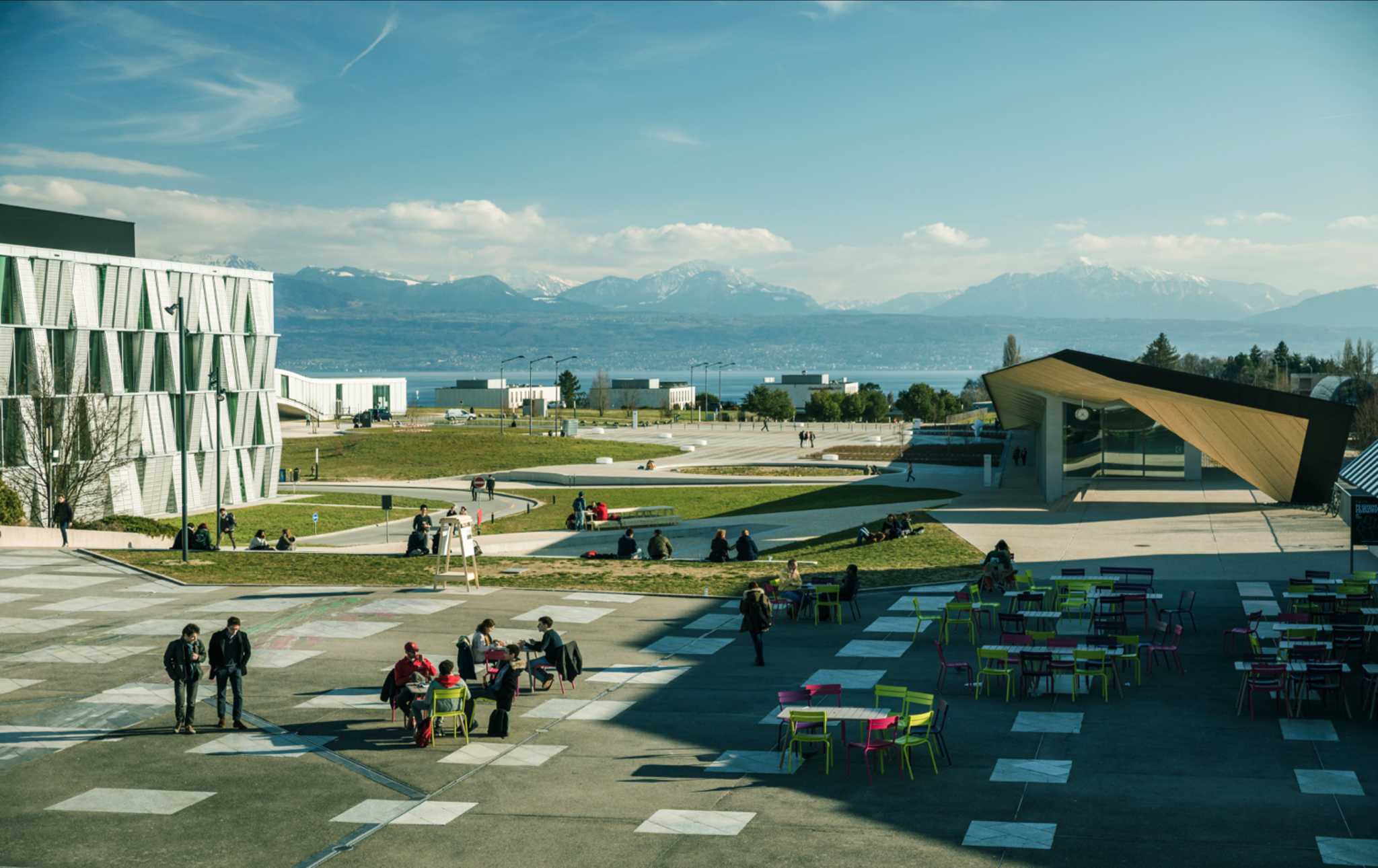 The University of Lausanne (UNIL) was one of the first two institutions to sign up for the Healthy Campus pilot phase of the programme
The University of Lausanne (UNIL) was one of the first two institutions to sign up for the Healthy Campus pilot phase of the programme
FISU executive committee member Fernando Parente presented on the pilot phase of the Healthy Campus. After an incubation period, the project kicked off in earnest this May with the meetings at Peking University in the Chinese capital city followed by the University of Lausanne on the campus ground of the FISU headquarters. These two universities are part of the next few crucial steps leading to the implementation of the programme.
In just the last month, five more universities have signed on. Joining in on the initiative’s pilot phase are: University of Western Australia (Australia), University of Johannesburg (South Africa), University of Turin (Italy), RUDN University (Russia), National University of La Matanza (Argentina).
Healthy Campus looks to move from pilot project to official launch sometime between January to April 2020.
WORLD UNIVERSITY CHAMPIONSHIP SEASON AGAIN IN 2020
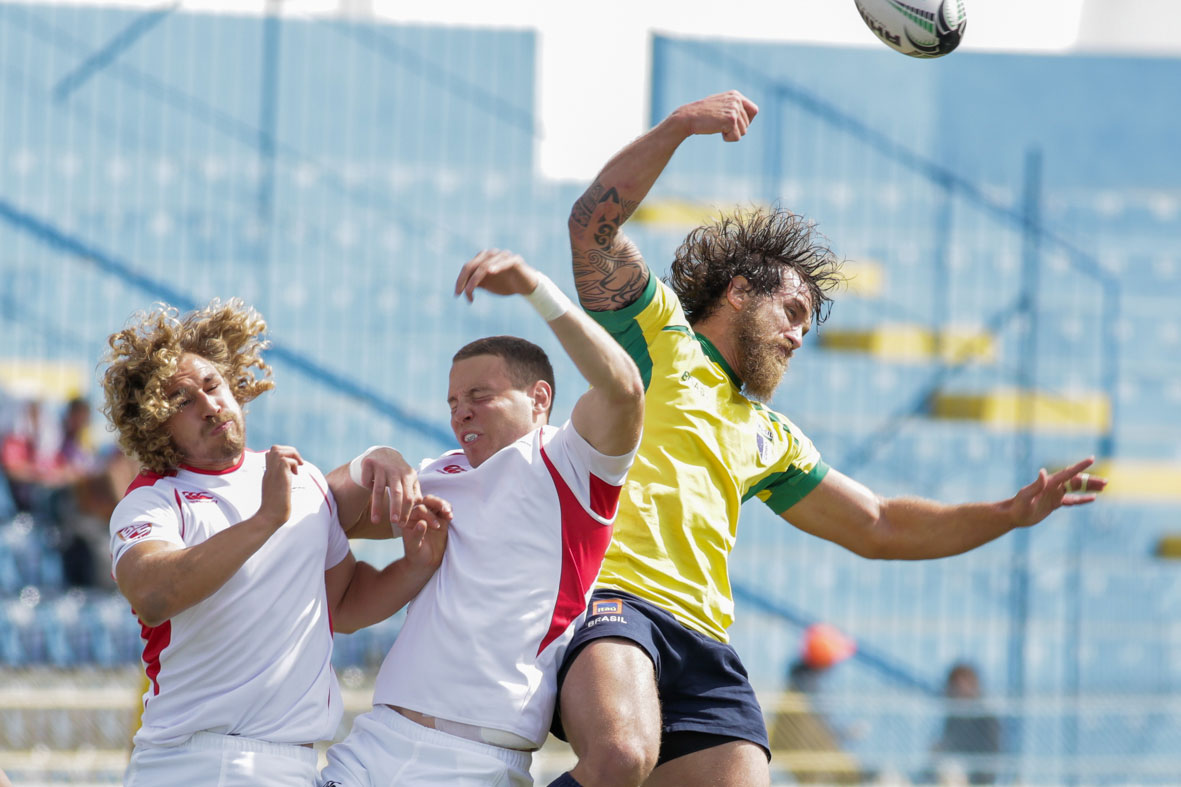 Rugby Sevens action from the 2018 World University Championship season
Rugby Sevens action from the 2018 World University Championship season
Learning from past hosts was a certain theme of the World University Championship presentation to the FISU Executive Committee, as FISU EC member Marian Dymalski led the presentation.
As single sport competitions, World University Championship events give cities and often university themselves the chance to host an international sports event with minimum cost and complexity. This philosophy continues uninterrupted as the idea of having a combat sports cluster with multiple competitive fighting sports event going on concurrently has been scrapped for the upcoming year.
 Modern Pentathlon made its World University Championship debut in 2018
Modern Pentathlon made its World University Championship debut in 2018
For 2022, 48 championship candidates from 26 countries have expressed interest in hosting. Evaluation of the bids will take place from 8-10 October 2019. In the interim, FISU is investigating whether to attribute both the 2022 and 2024 World University Championships together this fall. Interested countries that want to bid for only one of 2022 or the 2024 events may target one championship season.
Due to a tech-side change in the online accreditation system, sign-ups for next year’s championship events has been postponed until later in the summer.
UNIVERSITY WORLD CUPS EVENTS PROGRESSING
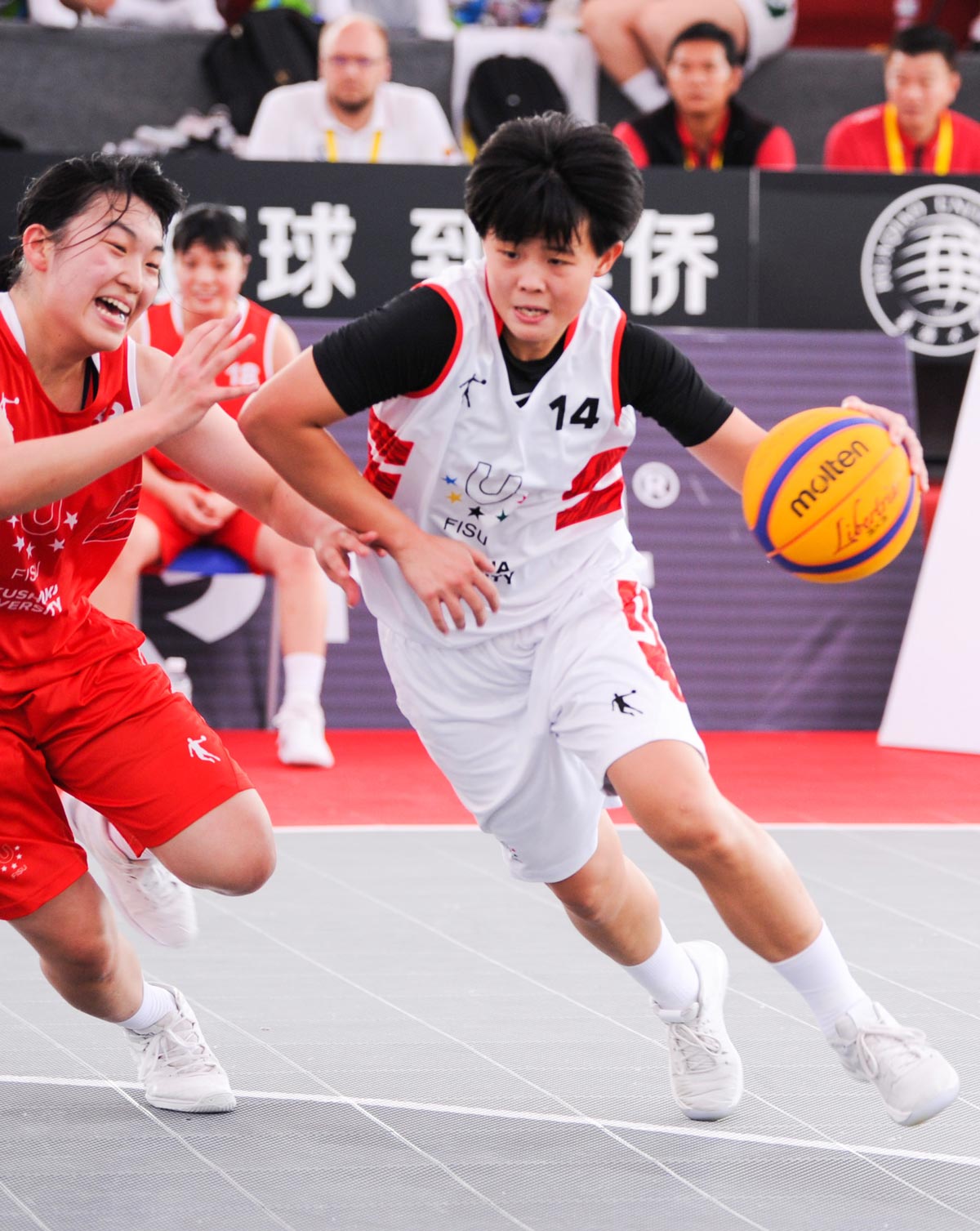 Tsinghua University takes on Takushoku University during the semi finals of last year’s Univesity World Cup – 3×3 Finals
Tsinghua University takes on Takushoku University during the semi finals of last year’s Univesity World Cup – 3×3 Finals
The trend towards university sports teams competing against one another on the international stage continues on the FISU sports programme. The trendsetting sports event — University World Cup 3×3 — continues with its fifth edition from 31 October to 3 November. Already, university teams from Asia, Africa and Oceania have qualified through continental qualifying tournaments in Asia, Africa and Oceania. The continental qualifiers in Europe, Americas and the second Oceania men’s and women’s team take place in early August.
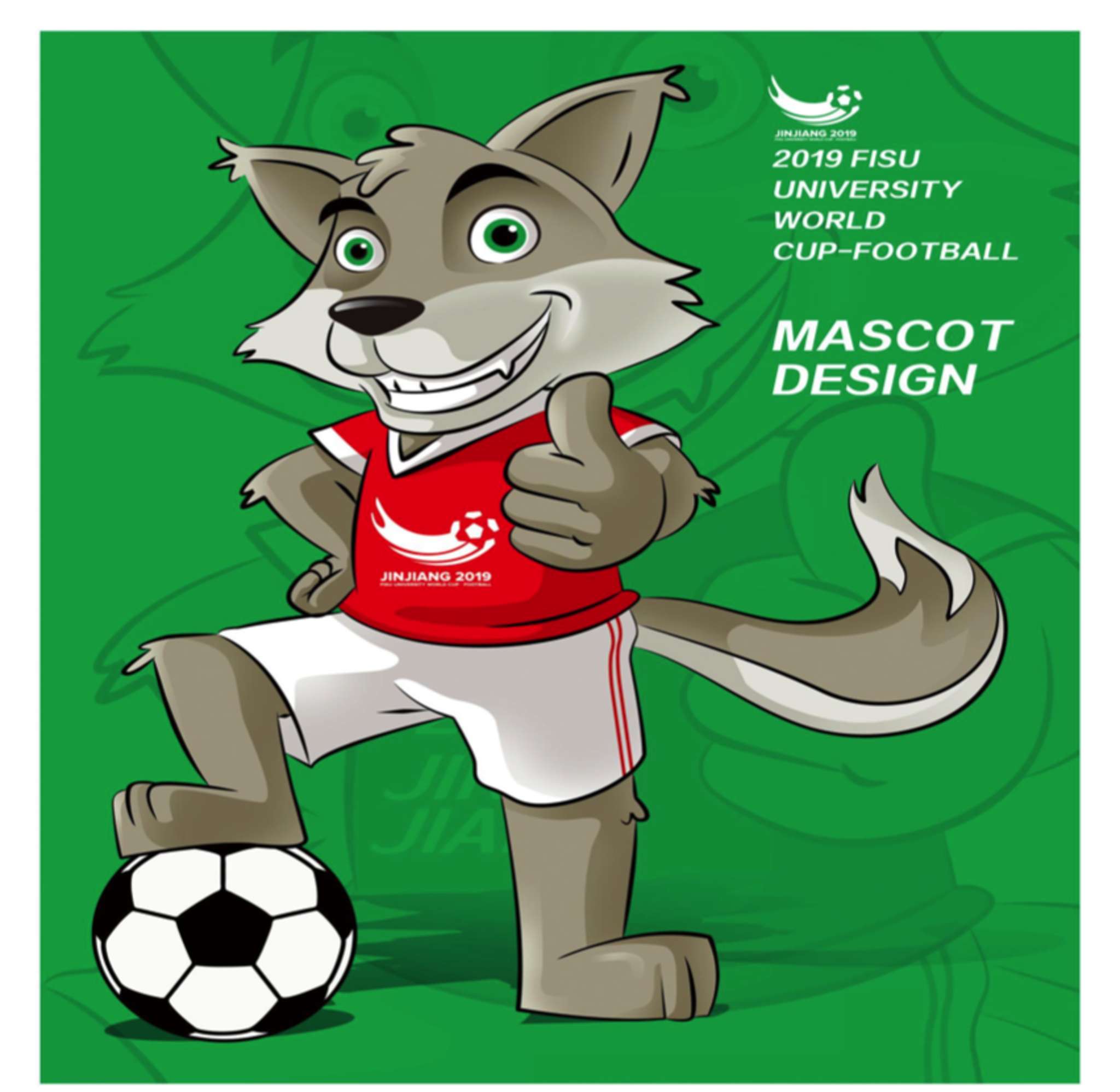 With its inaugural edition coming this November, the University World Cup – Football organisers had plenty of progress to report, particularly in the areas of delegation services, venue and infrastructure, sponsorship, and media services and communication, among others.
With its inaugural edition coming this November, the University World Cup – Football organisers had plenty of progress to report, particularly in the areas of delegation services, venue and infrastructure, sponsorship, and media services and communication, among others.
The football organisers from Jinjiang also unveiled a number of their marketing materials, including the event moniker.
“Our mascot has great meaning and is named Jin Gang Lang and brings great significance,” said Jinjiang mayor, Yue Lin. “This will be the brand of our event and means team spirit.”
Added Lin: “Our opening and closing ceremonies will be held the Jinjiang Football Park, with a cultural performance programme proposal. Two ideas for the cultural programme have been put forward and we are currently in the process of deciding which one we would like to have.”
Bringing rugby sevens from a World University Championship to a University World Cup event continues, with discussions underway for sponsors and potential host cities.
CHECKING IN WITH THE NEXT SUMMER UNIVERSIADE HOST: CHENGDU 2021
 Artistic rendering of what a sports-inspired Chengdu city neighborhood will look like before Summer Universiade 2021
Artistic rendering of what a sports-inspired Chengdu city neighborhood will look like before Summer Universiade 2021
Hints at Chinese elements and Chengdu charm were felt during the event preparatory presentation from the 31st Summer Universiade host city of Chengdu, China. Led by Madame Tian Rong, the Summer Universiade 2021 organisers presented a detailed report on how they are blazing forward since the games were attributed to the city at the last FISU Executive Committee in Krasnoyarsk.
Just months after attribution, the future hosts are moving forward on a range of projects with “Chengdu speed.” Over the next six months, this includes starting on key Universiade-related transportation projects, completing the Xindo Xiangcheng Sports Centre and renovating 37 sports facilities. Coordinating all these efforts are 11 working groups comprised of over 100 full-time staff.
A number of the Chengdu 2021 staff is in Napoli for the FISU Observer Programme, with the first CTI inspection visit anticipated in mid-November.
THINKING WINTER, THINKING #WELCOME HOME
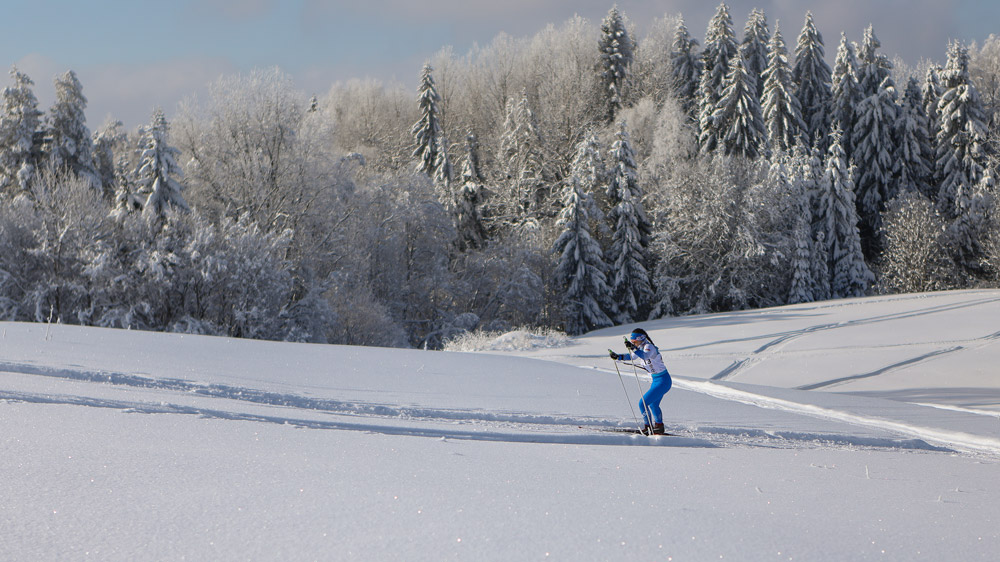 Ski Orienteering had a very successful edition of the World University Championships in the forest just outside of Tartu, Estonia last year
Ski Orienteering had a very successful edition of the World University Championships in the forest just outside of Tartu, Estonia last year
On a day of significant summer sports announcements, the Lucerne 2021 organisers were also on-point from the winter perspective, successfully bidding for the inclusion of ski-orienteering onto their sports programme.
While the sport — known as ski-o inside its sporting circle — makes up the tenth and final discipline of the event, which takes place from 21 to 31 January 2021.
After a pair of World University Championships, ski-o made it onto the Winter Universiade programme for the first time in Krasnoyarsk, Russia earlier this year.
Swiss University Sports President, Mike Kurt, applauded the decision. “Hardly any other sport so clearly exemplifies the motto of the international association ‘Excellence in Mind and Body.’”
Lucerne 2021 managing director, Urs Hunkeler, said today’s announcement was an important milestone in a long-term strategy. ““For us it is a great opportunity to show the Swiss population university sports, promoting legacy and use this event in order to show there is a big legacy,” Hunkeler said. “ I am sure we will encounter a great games, which will have an impact on Swiss sports and society”
Lucerne 2021 organisers provided updates on timing and scoring providers, event accommodation, information and communication technologies, media services, sport, workforce and sustainability.
Led by our Head of Sustainability, our working group has made a sustainability charter,” said Lucerne 2021 head office leader, Regula Schweizer. “This has allowed everyone to go forward with the concept.”
BIDDING FAREWELL TO THE WARM HEARTS OF KRASNOYARSK AND WINTER UNIVERSIADE 2019
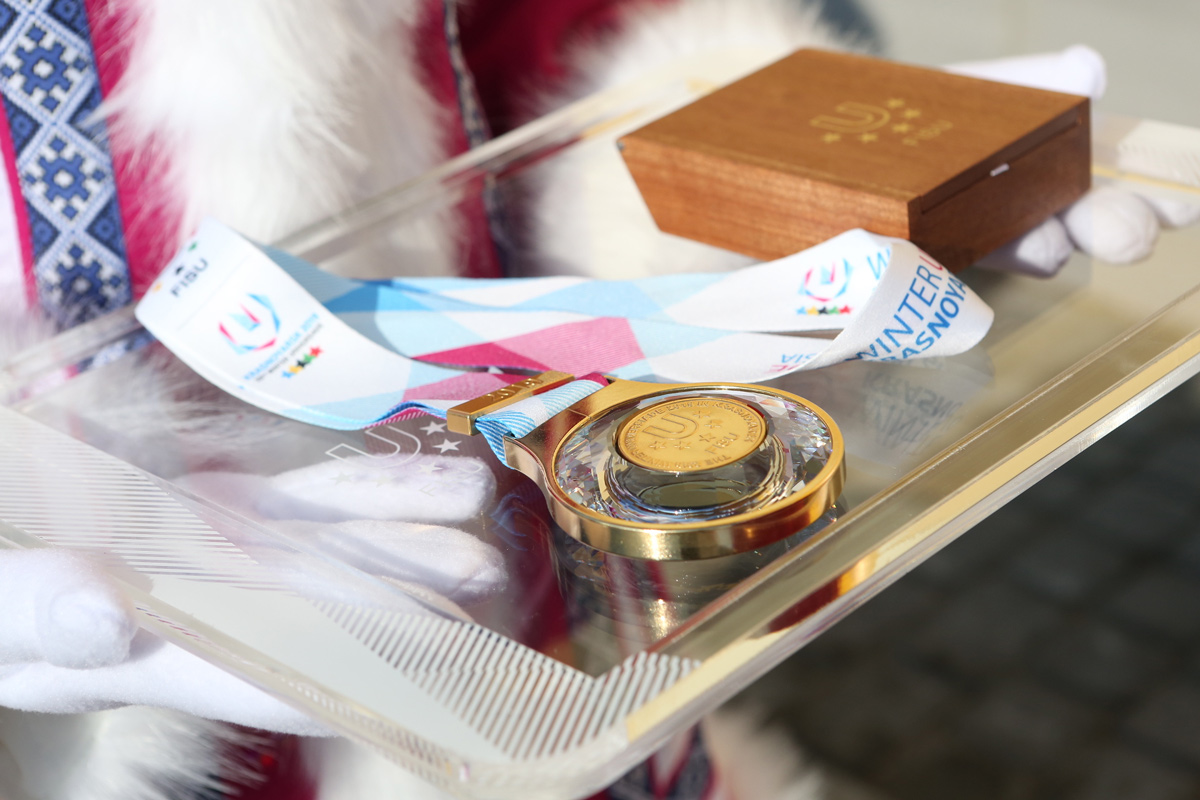 From athlete to spectator experience, the Krasnoyarsk 2019 Winter Universiade was a gold medal event
From athlete to spectator experience, the Krasnoyarsk 2019 Winter Universiade was a gold medal event
Even the best of times have to come to an end. In the case of the Winter Universiade, today’s presentation marked the final time that FISU executive leadership would formally hear from the host city.
Six years since the event was attributed to the Siberian city in FISU’s former home of Brussels, today’s presentation was a proud look-back to the 29th Winter Universiade. Led by the event director general Maxim Urazov, the presentation focused on a video tribute to the event, and the efforts of the organiser.
From preparation of the competition arena to audience engagement, Krasnoyarsk organisers pushed the Winter Universiade event to new heights. This included over 300,00 event tickets and more than 1.8 million souvenirs being sold. The international broadcast reached 300 million people with social media garnering 100 million more views.
While #realwinter might have one bid us goodbye, the organisers left FISU with one last gift. Watch, because this is a fitting tribute.
The presentation ended with the FISU Executive Committee giving the Winter Unviersiade 2019 organisers a standing ovation. Tears were shed.
“Your energy, I believe that will be your legacy,” President Matytsin said. “This is the best, as this is a living legacy. While we say goodbye, know you are part of the future of university sport.”
Added the FISU President: “With Ekaterinburg now on the Universiade programme our recommendation to the host would be to draw on your energy and expertise.”
